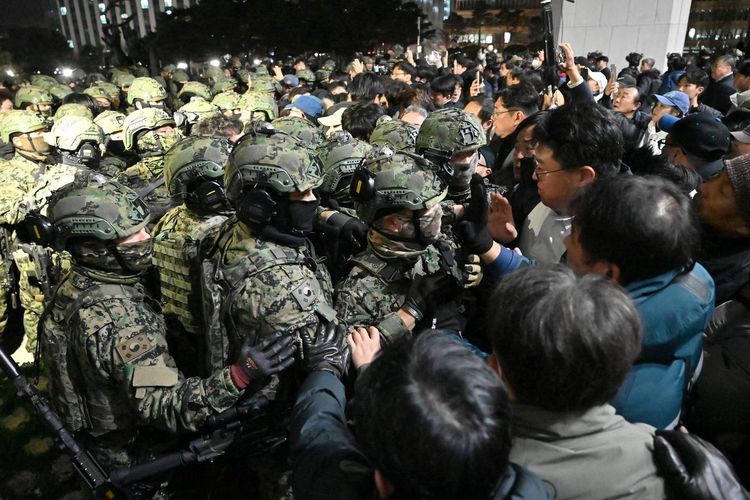The South Korea Martial Law Memes, Explained

TOPSHOT - Soldiers try to enter the National Assembly building in Seoul on December 4 2024, after ... [+] South Korea President Yoon Suk Yeol declared martial law. South Korea's President Yoon Suk Yeol on December 3 declared martial law, accusing the opposition of being "anti-state forces" and saying he was acting to protect the country from "threats" posed by the North. (Photo by Jung Yeon-je / AFP) (Photo by JUNG YEON-JE/AFP via Getty Images)
AFP via Getty ImagesIt has been a wild 24 hours in South Korea. The country’s president, Yoon Suk Yeol, declared martial law and sent the armed forces into the streets of Seoul. Around six hours after this happened, the South Korean parliament unanimously voted down Yoon’s decision. This led to the president lifting martial law after only around six hours.
Now, this article isn’t about the political ramifications of this situation or drilling down into precisely what happened, there are plenty of other sources for that.
Instead, we’re going to be talking about how parts of the internet reacted to the news of South Korea’s brief foray into martial law — and the part that memes play in the modern consumption of news.
What Happened Online During The South Korea Martial Law Crisis?To start with a quick note: this article is looking at English-language posts, meaning the reaction will be more skewed towards the United States and Europe. The online experience in South Korea and surrounding countries is likely going to be different. With that out the way, let’s truck on.
There were a few threads of reactions to the South Korea martial law crisis online. One common type of post was using pop culture to express relief at the fact democracy prevailed:
Another thread were posts that used well-known meme formats to reflect and spread information about the South Korean situation:
One interesting theme found across the various reactions to the South Korea martial law crisis were posts that reflected the internet back to itself in a meta way. Effectively, ironically investigating its own reaction to the situation, like this:
The four tweets shared in this article so far have been viewed millions of time between them, and there are many more out there.
So what can we learn from them?
The South Korea Martial Law Memes Show How The Internet Reacts To CrisisBroadly speaking, memes about world events like this fall into two categories. The first is as a coping mechanism, and the other is about communicating information.
Let’s look at the first. World events are terrifying. Humanity evolved to be in groups of around 150 people and, biologically, we’ve barely moved on since those days. To put that another way, we’re more tuned to be comfortable with issues that impact small groups, not the entire world.
Yet, social media and the news cycle opens us up to problems on a global scale that can make us feel powerless. Just like the South Korea martial law crisis.
Memes, and specifically the funnier side of these, can help process these emotions. Laughter is a well-known stress reliever, so people both making and consuming memes can be seen as a way of coping with trying events. It’s using humor to defuse a tense world.
The second function of memes in situations like the South Korea martial law crisis is about communicating information.
Humanity is currently experiencing an information overload. In simple terms, through social media, advertising, and the raft of other content in the world, people now absorb too much information to adequately process.
When, in the past, we may read a newspaper article and then have several hours to digest those facts, now we see something on social media and have mere seconds before we move onto something else.
In this high-paced environment, memes help us make sense of what’s actually going on.
This doesn’t mean the information shared in memes are accurate, more that they provide an easy way to form an opinion and garner a more rounded view of what’s happening, even if this is happening subconsciously. They’re a cheat sheet, a way of feeling we know more about current events than we actually do.
Ultimately, in situations like the martial law crisis in South Korea, memes move beyond being simple jokes and operate both as a communication tool and coping mechanism.
Whether this is a good thing or not is open to debate, but one thing’s clear: the South Korea martial law crisis shows that memes are a core way the online world deals with huge events — and that won’t change any time soon.



















































